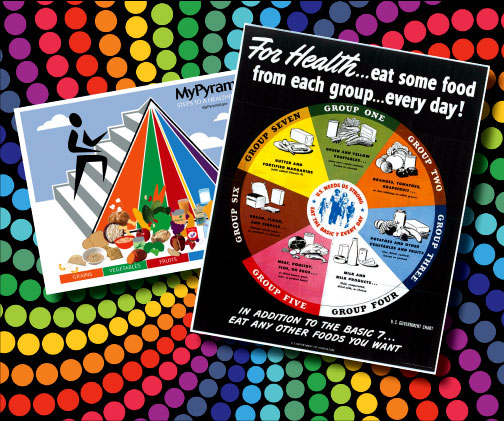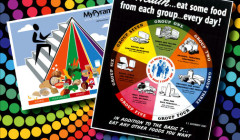Medical Mythbusters
Sometimes that’s how I feel. I am by no means a lone voice crying out in the woods in talking about the exaggerated benefits of statin therapy, the limited data to support dietary sodium restriction, the modest and controversial benefits of aspirin therapy for primary prevention but it sure seems like it.
 I write today about birth and death. The birth of dietary guidelines and the death of common sense. I know you think the government is careful and thorough in all things…I mean look at how well Obamacare is doing, our war against terrorism, our carefully balanced budgets etc. Well, the dietary guidelines were crafted years ago…perhaps the government was somehow better, more honest then. Sorry to disappoint but read on.
I write today about birth and death. The birth of dietary guidelines and the death of common sense. I know you think the government is careful and thorough in all things…I mean look at how well Obamacare is doing, our war against terrorism, our carefully balanced budgets etc. Well, the dietary guidelines were crafted years ago…perhaps the government was somehow better, more honest then. Sorry to disappoint but read on.
I will write more about the cholesterol con in further posts but today I focus on dietary guidelines. In 1977 the United States Select Committee on Nutrition and Human Needs convened a consensus panel… (one of the participants quipped that if there was real consensus they wouldn’t need a panel) That panel concluded… despite the lack of any real evidence that dietary fat caused heart disease and obesity. Interestingly enough for you history buffs the chair of the committee was Senator George McGovern. The panel’s guidelines became the Dietary Goals for the United States and
the instructions were to eat more carbohydrates and less fat. Specifically the guidelines said you should consume 55-60% of your calories from carbohydrates! As the great Dr. Jason Fung points out in his book “the Obesity Code” the American Heart Association’s guidelines in 1995 “Americans should eat six or more servings of breads, cereals, pasta and starchy vegetables and to choose fruit juices and carbonated beverages as your liquids of choice.” Six servings of bread? Carbonated beverages as the liquids of choice? This seems laughable ! How can this be a real recommendation? The results of these recommendations? Heart disease did not decrease significantly as was predicted but obesity has increased to “epidemic” proportions. Current recommendations are still based on misguided interpretations of research done years ago. There is almost no scientific basis for the current guidelines. For a an absolutely superb video on this subject… check out Dr. Peter Attia on youtube or his website “the eatingacademy.com”. His common sense, easy to follow review of massive amounts of historic and current data…the same data some of the guidelines use to make their recommendations and so much of the conflicting data that has been ignored will completely convince you of the errors of our current thinking.
 Just from a common sense standpoint… who could believe that such completely natural things like eggs and butter could be deadly and you should instead use this alien yellow substance in a slightly different yellow colored plastic container. We were told the fat in milk is bad for us… not a shred of evidence to support that and instead we became a nation of soda drinkers or just as bad… juice drinkers… if, as is typical, the juice contains high fructose corn syrup. We all learned to cut off the fat from our steak while at the same time consuming more nitrate containing bologna and hot dogs. We were told that breakfast was the most important meal of the day which is worse than nonsense since the typical american breakfast consists of some cereal product. News alert… there is no healthy cereal period. It’s all processed carbohydrates. It’s the worse thing you could put in your mouth in the morning. The worse thing. I recoiled in horror the other day when I learned that a relative of mine was so proud of the fact that they had the same thing for breakfast every day… Cheerios. First, wouldn’t a little variety be nice? Who really wants to eat the very same thing every morning ? Well I could understand if the results were impressive but let’s just say the Cheerios have left an impression on my relative. A BIG impression.
Just from a common sense standpoint… who could believe that such completely natural things like eggs and butter could be deadly and you should instead use this alien yellow substance in a slightly different yellow colored plastic container. We were told the fat in milk is bad for us… not a shred of evidence to support that and instead we became a nation of soda drinkers or just as bad… juice drinkers… if, as is typical, the juice contains high fructose corn syrup. We all learned to cut off the fat from our steak while at the same time consuming more nitrate containing bologna and hot dogs. We were told that breakfast was the most important meal of the day which is worse than nonsense since the typical american breakfast consists of some cereal product. News alert… there is no healthy cereal period. It’s all processed carbohydrates. It’s the worse thing you could put in your mouth in the morning. The worse thing. I recoiled in horror the other day when I learned that a relative of mine was so proud of the fact that they had the same thing for breakfast every day… Cheerios. First, wouldn’t a little variety be nice? Who really wants to eat the very same thing every morning ? Well I could understand if the results were impressive but let’s just say the Cheerios have left an impression on my relative. A BIG impression.
 So yes I am saying that eggs and butter and steak and milk are very healthy foods. The idea that you should substitute one fat for another is flawed. The one exception is trans fats… completely manufactured fats for the most part. You avoid trans fat and processed sugars when you avoid processed foods. Anything out of a box is processed. Many current dietary guidelines say to limit saturated fats and substitute fats like linoleic acid will cut down the risk of stroke and heart attack.
So yes I am saying that eggs and butter and steak and milk are very healthy foods. The idea that you should substitute one fat for another is flawed. The one exception is trans fats… completely manufactured fats for the most part. You avoid trans fat and processed sugars when you avoid processed foods. Anything out of a box is processed. Many current dietary guidelines say to limit saturated fats and substitute fats like linoleic acid will cut down the risk of stroke and heart attack.
Now it gets interesting because recently data from the Minnesota Coronary Experiment which looked at just this question has been reexamined. As published in Cardiology Today July 2016 (hows that for current data!). The data are very damning for the guidelines. This was a double blind study involving almost 10,000 people They wanted to see if substituting linoleic acid for typical fats would cut down on cholesterol levels and heart attacks and death. Those are some easy to understand endpoints. Dr Zaomora and colleagues found that the change in diet did indeed lower cholesterol but it had no mortality benefit whatsoever. The change in diet did not decrease deaths. In fact the researchers found that as the cholesterol level lowered the risk of death actually increased! At autopsy the group on the linoleic acid died were found to have twice as many heart attacks as the regular diet group… twice the number of heart attacks!
Now I don’t trust metaanalysis data (where multiple trials are lumped together to try to find significant findings) as much as I trust the double blind trials like the one above but the same investigators included the above trial and 5 other trials and found there was no association between serum cholesterol and BMI. They found no association between cholesterol lowering interventions and heart disease mortality or all cause mortality. This is pretty damning stuff! This analysis is saying that cholesterol lowering drugs have not shown any benefit in terms of how long you will live!! This is not the only trial that has shown this. A recent paper looked at trials in high risk patients… the elderly, people with diabetes, people with kidney disease, and people who have had bypass surgery and the vast majority of these trials showed no benefit in terms of all cause mortality. Even in high risk patients… taking a statin will lower your cholesterol nicely but just doesn’t have an impact in terms of how long you will live. We will talk about relative risk and absolute risk and the number needed to treat in subsequent articles but even the most “convincing” data from a recent trial showed that a thousand people have to take the pill for years and only one person might actually live longer…that’s not very convincing or encouraging to me.
 Unfortunately when you show data that disputes the current “Cholesterol is bad…if your cholesterol is high you must take a pill” dogma usually the establishment just rejects it. For example when Dr Willett …chair of nutrition at Harvard… was confronted with the evidence that changing the fats in your diet was either unhelpful or actually harmful..evidence from a large trial done using what we think are the best research methods available… his response was “this report adds no useful new information and is irrelevant to current dietary recommendations…” How do you argue with a person who won’t even acknowledge the basic data?
Unfortunately when you show data that disputes the current “Cholesterol is bad…if your cholesterol is high you must take a pill” dogma usually the establishment just rejects it. For example when Dr Willett …chair of nutrition at Harvard… was confronted with the evidence that changing the fats in your diet was either unhelpful or actually harmful..evidence from a large trial done using what we think are the best research methods available… his response was “this report adds no useful new information and is irrelevant to current dietary recommendations…” How do you argue with a person who won’t even acknowledge the basic data?
Well you and I have had 40 years or so of dietary brainwashing and it’s going to take more than one column to help you come into the light. For some great summer reading on this from much better and more knowledgeable doctors than myself look to Dr. Malcolm Kendrick , Dr. Peter Attia and Dr. Jason Fung.
Lest you think me a lone nut job… well I may be a nut job but I am not alone in my distrust of much of what we have been told…let me end with a quote from someone more prominent and public than myself…”It is simply no longer possible to believe much of the clinical research that is published, or to rely on the judgement of trusted physicians or authoritative medical guidelines. I take no pleasure in this conclusion, which I reached slowly and reluctantly over my two decades as an editor of the The New England Journal of Medicine” Dr. Marcia Angell. Until next time…yours in gentle scepticism.










